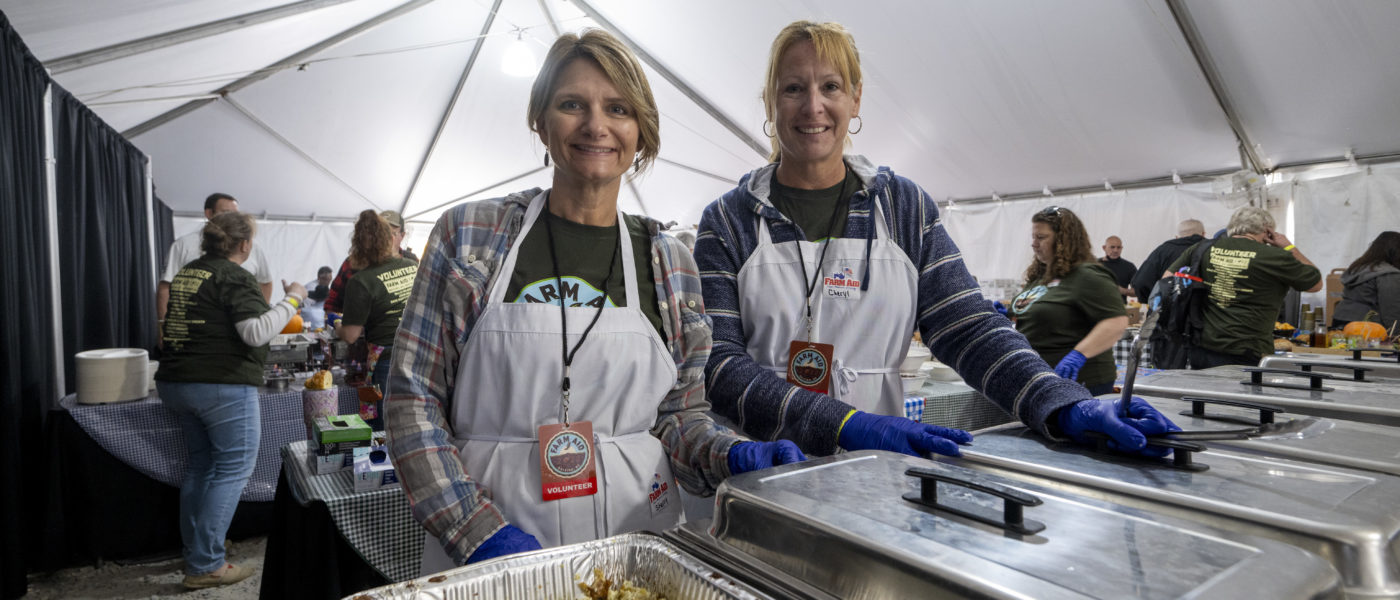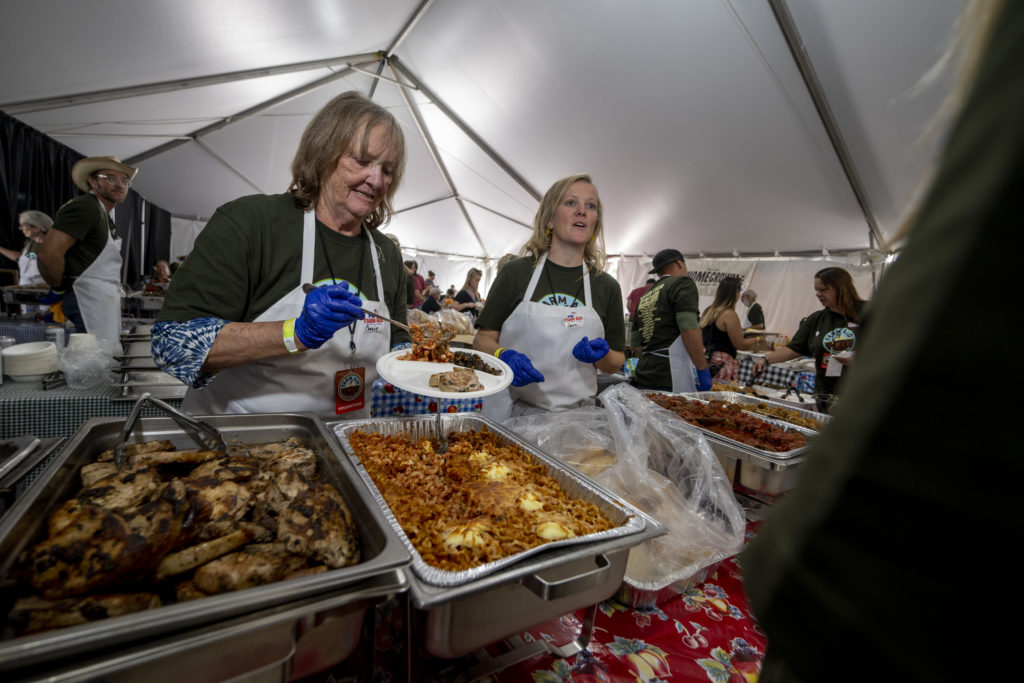Farm Aid 2022, that day we all eagerly anticipate, has come and gone. However, the story is far from over. Let’s peel back the curtains on one cycle of the Festival, from soil to salvation.
Since 2007, Farm Aid has dedicated itself to sourcing products from family farmers who practice sustainable methods at a fair price to create the festival’s HOMEGROWN Concessions® offerings. This year was no different; menus throughout the venue celebrated North Carolina’s unique bounty gathered from local and regional family farms and fisheries, including roasted brussels sprouts, fish tacos, and stuffed sweet potatoes. Farm Aid’s HOMEGROWN Concessions® has since become a festival hallmark and could serve as a model for other events. Backstage, our crew, volunteers, artists and VIP Experience guests enjoy HOMEGROWN Catering. But what happens after the crowds have gone home with full bellies? Where does the remaining food go? And with this year’s festival highlighting climate change, what options offer an honorable solution? As always, Farm Aid donated food waste to local hunger relief after the festival event.
Between food insecurity and food waste, how remaining foodstuffs are reallocated (instead of tossed in a landfill) deserves serious consideration. Approximately 30% to 40% of America’s food ends up in the trash each year. Put another way, 30% to 40% of the fertilizers spread on fields, and thus drain into our rivers, lakes and aquifers are for nought; 30% to 40% of the agriculturally generated greenhouse gasses needlessly belch into the sky and 30% to 40% of our agricultural soils are degraded for no reason… and the number of those wondering where their next meal will come from continues to mushroom.
The answer for Farm Aid 2022 arrived in the form of Inter-Faith Food Shuttle (IFS), a non-profit organization dedicated to eradicating hunger in their seven-county service area surrounding Raleigh/Durham/Chapel Hill in North Carolina. IFS arose from an otherwise unremarkable lunch date between two women of different faith backgrounds, Jill Bullard (Christian) and Maxine Solomon (Jewish). The two admitted soccer moms happened to notice the kitchen staff shoveling the remains of the breakfast shift into the garbage. They promptly rescued the remaining items and brought them to a shelter where forty-four more meals resulted for folks in need. Since they literally “shuttled” food from the restaurant to the shelter, their children dubbed the newly formed non-profit Inter-Faith Food Shuttle. It should be noted that today, IFS has ceased to be a faith-based organization. As Laura Rice, IFS Communications Manager notes, “We serve all faiths, no faiths, we serve everyone.”
IFS’s three program categories, “Feed,” “Teach” and “Grow,” reflect their conviction that nutrient rich food is a basic human right deniable to no one. They also recognize that tackling food insecurity requires a multi-pronged approach. The “Feed” program constitutes IFS’ food waste recovery and redistribution efforts that support individuals who lack access to nutritious food. Their expansive suite of innovative programs and partnership with a network of 200 institutions–primarily agencies, schools, churches and community centers–allows them to serve 720,000 families throughout the seven county service area surrounding Raleigh with 9 million pounds of food each year, while also saving 7.2 million pounds from landfills.
The number of food pantries in the US has exploded, from a few hundred in 1980 to 50,000 today.
While such herculean efforts relieve hunger temporarily, systemic barriers that perpetuate hunger persist. If food assistance programs were singularly effective in the “fight against hunger,” most would have closed shop with nary a hungry mouth remaining. Instead, the number of food pantries in the US has exploded, from a few hundred in 1980 to 50,000 today to keep pace with the 400% increase in people living with food insecurity during the same time. Not surprisingly, the most vulnerable groups, children, the elderly, and Black, Indigenous and People of Color (BIPOC) populations bear the brunt, further illuminating disparities that have remained entrenched for too long. Solutions to forces that prevent transformational change such as income disparity, racial inequality, and a lack of political will are beyond IFS’ purview; however, other steps towards food security, namely making locally produced, healthy food accessible to the most vulnerable is well within their repertoire.
Escalating food insecurity hasn’t bypassed North Carolina by any means, especially during COVID-19. Rice reports that one of IFS’s partners went from serving approximately 60 families a week to 500 families a week, and despite COVID’s decline the numbers haven’t budged. She wryly observes, “We were bombarded with these images on the nightly news every night of these lines of cars of families seeking food. Well, those families are still seeking food; you’re just not seeing it on the news anymore.”
Kara Guido Siek, IFS Food Sourcing Specialist, notes the impact of COVID and inflation on the underemployed. “So many folks have jobs but still can’t afford diapers and formula. Some of them are working several jobs and they’re still not able to recover from the pandemic.”
Rice wholeheartedly agreed, “The face of hunger has definitely changed. The people we’ve seen for the last couple of years are people that never thought they’d be in this position.”
At the same time that demand rose, donations shriveled as inflation reared its head and the country shifted into conservation mode. Annual corporate food drives faltered and grocery chains cut back on donations. As Guido Siek noted, “Large grocery store chains were donating hundreds of pounds a month to us pre-COVID. During COVID and still today, we’ve seen a substantial decline because they’re not purchasing as much or they’re trying to use their waste in new ways.”
The day after Farm Aid 2022, IFS’ dedicated crew loaded 7,601 pounds of remaining food stuffs from HOMEGROWN Catering into their refrigerated trucks.
Paradoxically, efforts to assume corporate environmental responsibility can have unintended repercussions downstream. Guido Siek offered this example: a large commercial supplier decided to start a composting program, which turned the taps off on a major source of IFS’ fruit and vegetable supply. For a team deeply committed to going beyond the basic needs of calories, such pills are hard to swallow. The option of purchasing food amid inflation poses its own challenges, as so many Americans can attest. Prices of common protein sources like meat have increased between 8% and 11% over the past year and eggs have gone up 33%.
Regardless of the shifting tides, IFS remains steadfast in its commitment to serving its communities, largely by reframing how to maximize the rich resources the area boasts. For example, it’s widely acknowledged that local producers are a vital component of any thriving food system; yet food security models that adequately integrate them remain elusive for a variety of reasons. In the past, IFS struggled with some of those barriers; travel time to pick up excess food from multiple farms across a broad geographical area precluded larger scale collaboration with local farmers. When gas prices skyrocketed, it could have been the final straw. Instead, IFS devised a system that removed them as middleman, allowing rural, low-resource farmers to deliver directly to food distribution centers. That adjustment gives producers a larger portion of the food dollar they receive for their products, spares IFS the financial burden of staff and fuel costs, conserves precious natural resources and strengthens community ties.
IFS’ Food Shuttle Farm provides another source of nutrition, as well as inspiration. Owned and operated by IFS, this fourteen-acre plot just south of Raleigh’s metropolitan area generates fresh, organic produce for its food insecure neighbors. The farm also insulates them somewhat against those external supply line disruptions. An impressive 80% of the farm’s crops go directly to IFS’s programs and distribution centers, thanks to the farm team of four full time employees and 200 volunteers. The other 20% is sold at a farm stand, with proceeds contributing toward expenses. Rice touts the farm’s unique role in empathy and community building for its volunteer., “It is one of few places where you can put something in the ground, tend it, harvest it and then actually help put it in the hands or someone in need.”
Food Shuttle Farm also grants control over crop selection to their clients, which is no small thing. Reducing food waste partly revolves around providing food that people value. IFS staff members and volunteers routinely audit what resonates with the people they serve, and then integrate that feedback into their crop cycles. Rice stresses the power in equipping people with recipes and lessons for lesser-known crops. “If you’re distributing Swiss chard and somebody doesn’t know the first thing about cooking Swiss chard, then it makes a lovely vegetable to throw in your trash can.”
Furthermore, it’s easy to forget that access to refrigerators, ovens or even hot plates isn’t a given, which makes fruits and vegetables that can be consumed raw desirable. Raleigh boasts a dynamic Latinx community yearning for culturally appropriate ingredients. In response, IFS grows a variety and quantity of peppers, as well as Chayote squash, a lumpy green pear-shaped gourd that acts as a mild canvas against which more vibrant flavors shine. It’s a simple way to celebrate food’s central role in community building and cultural food heritage. Finally, Food Shuttle Farm serves as a venue for IFS’ two other program categories, “Teach” and “Grow.” Today, more than 7,000 people a year participate in gardening, cooking and health workshops that lead to improved nutritional awareness, stronger career skills and enhanced self-sufficiency.
The day after Farm Aid 2022, IFS’ dedicated crew loaded 7,601 pounds of remaining food stuffs from HOMEGROWN Catering into their refrigerated trucks. Given recent conditions, Farm Aid’s contribution is the largest they received this year. Examples of establishments that welcomed the cache include Raleigh Rescue Mission; Durham Rescue Mission; TROSA, a substance abuse transition home; and Shepherds Table, a shelter historically for people with AIDS and HIV. As demand mushrooms, category differentiation is falling away. “Over the last 2 1/2 years, many service agencies have transitioned to whoever is in need.”
Climate change continues to lay bare the interconnection between farming and food security. Transforming our food systems to benefit the planet only succeeds if it also benefits people, all people. From Farm Aid’s perspective, Inter-Faith Food Shuttle is a valuable partner in addressing environmental and social injustices.





